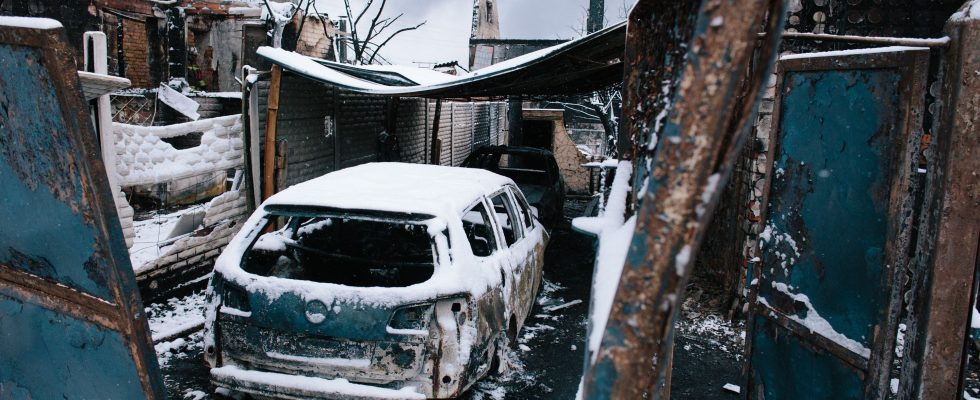While Emmanuel Macron spoke this Saturday with Ukrainian President Volodymyr Zelensky concerning Ukraine’s “arms needs”, across the Atlantic, it was Donald Trump who stood out again, saying “to encourage” Russia to attack NATO countries that are in arrears.
Information to remember
⇒ New night attack by Russian drones in Ukraine
⇒ Trump threatens not to defend NATO countries in arrears
⇒ Paris, Berlin and Warsaw will announce cooperation on disinformation this Monday
45 nighttime drone attacks in Ukraine, most foiled
Ukraine announced that it had destroyed most of the 45 drones launched by Russia overnight. “At the end of the fighting, 40 Shahed drones were destroyed,” the Ukrainian air forces said on Telegram, while falling debris slightly injured a 39-year-old man in the Dnipro region (central-east). According to the authorities of kyiv and the central region of Cherkasy, no damage has been noted at this stage.
However, air-guided bombs targeted the village of Vodyane in the eastern Kharkiv region, killing a 56-year-old woman, the governor, Oleg Synegubov, said. The day before in Kharkiv, seven people including three children, aged 7 and 4, and a six-month-old baby, were killed during a nighttime drone strike on a gas station which unleashed a “river of fire” in a street and destroyed around fifteen houses.
Trump says he is “encouraging” Russia to attack NATO countries that are in arrears
Donald Trump threatened this Saturday, in the event of re-election in the United States, to no longer defend NATO countries in arrears, even going so far as to “encourage” Russia to attack them. The former American head of state and candidate for the 2024 presidential election regularly criticizes his allies in the North Atlantic Treaty Organization for not sufficiently funding the institution.
During a meeting in South Carolina, Donald Trump reported a conversation with one of the heads of state of NATO, without naming him. “One of the presidents of a big country stood up and said: well, sir, if we don’t pay and we are attacked by Russia, will you protect us?” says the billionaire before revealing his answer: “No, I would not protect you. In fact I would encourage them to do whatever they want to you. You must pay your debts.”
“Encouraging the invasion of our closest allies by murderous regimes is appalling and senseless,” responded Andrew Bates, White House spokesperson, in a statement released Saturday evening. “Rather than calling for war and promoting chaos, President Biden will continue to support American leadership,” he added.
Paris, Berlin and Warsaw will announce cooperation on disinformation this Monday
France, Germany and Poland will unveil new cooperation on Monday against foreign disinformation operations, particularly coming from Russia, the head of French diplomacy announced in an interview with the regional daily West France. Stéphane Séjourné, his German counterpart Annalena Baerbock and Polish Radosław Sikorski will also report new information attacks launched by Moscow against the three countries.
So far, attacks have notably been carried out via troll factories and fake news sites. “We will transparently reveal to public opinion the instruments of this disinformation. We will reveal the attacks that are being committed. And with proof,” he assured, also noting “concordant elements which indicate that there are dormant operations. Tools that can be activated at any time, particularly during an election” in the three countries.
Presidential election day in Finland
Finns vote this Sunday to elect their president, whose role has increased since joining NATO last year and worsening tensions with neighboring Russia due to the war in Ukraine. Endowed with limited powers compared to the Prime Minister, the head of state, elected for six years, nevertheless directs the country’s foreign policy in close cooperation with the government. He is also supreme commander of the armed forces.
Some 4.3 million voters must choose between the former conservative Prime Minister, Alexander Stubb, who came first in the first round on January 28 with 27.2% of the vote, and the former head of diplomacy, Pekka Haavisto , member of the Greens but who is running as an independent (25.8%). The two candidates, both former foreign ministers, share the same vision on the position to adopt towards Russia with a strengthening of sanctions against Moscow. The difference between them comes down to nuances, explains researcher Theodora Helimäki to AFP, who cites the question of the storage and transport of nuclear weapons in Finland.
